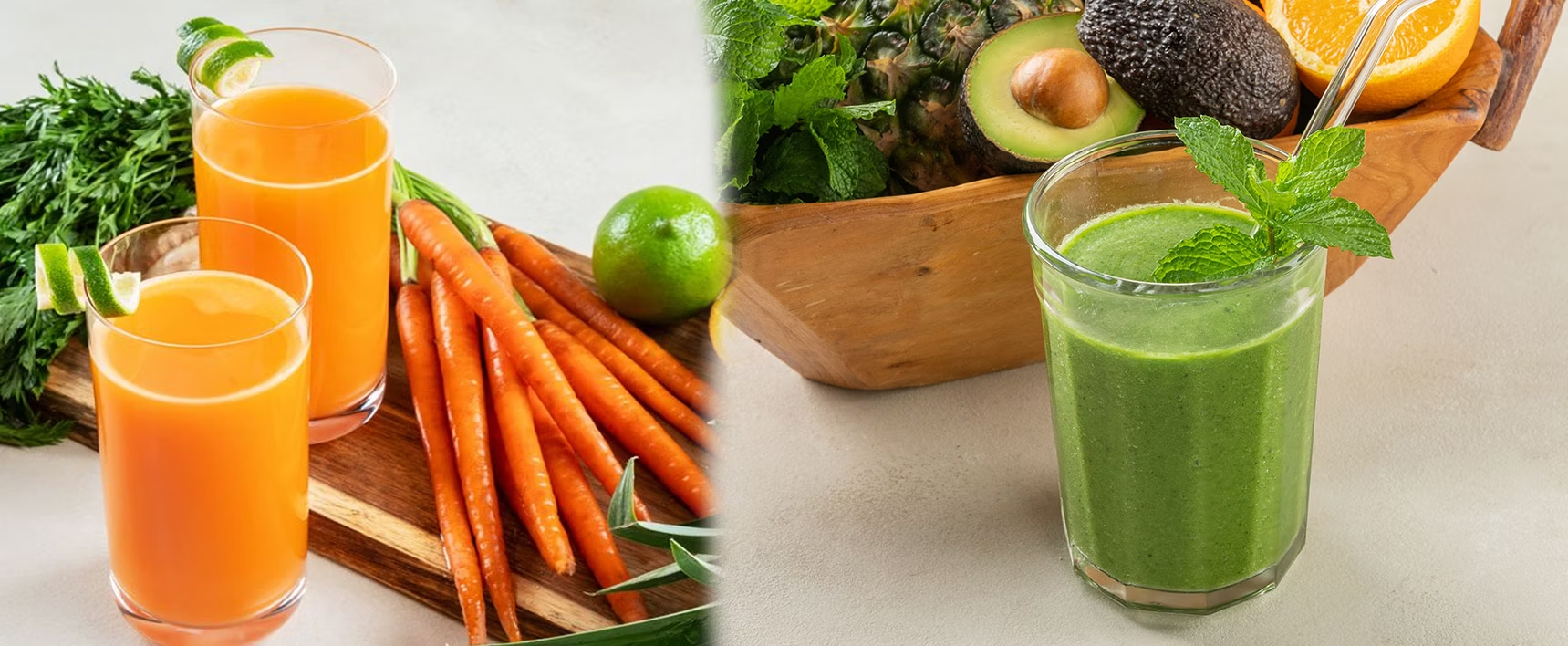Your cart is currently empty!

Smoothies vs. Juices: Which Is the Healthiest Breakfast Choice?
•
When it comes to starting your day with a nutrient-packed breakfast, the debate often comes down to smoothies vs. juices. Both are popular options, but which one is truly the healthiest breakfast choice? Each offers unique benefits and drawbacks, depending on your health goals and dietary needs. Let’s explore the pros and cons of smoothies and juices to determine which option reigns supreme for a healthy morning routine.
Top Supplements for Gut Health
What Are Smoothies?
Smoothies are blended drinks made from whole fruits, vegetables, and other ingredients like yogurt, nuts, or seeds.
Benefits of Smoothies
- Fiber-Rich: Smoothies retain the fiber from fruits and vegetables, promoting digestion and keeping you full longer.
- Versatile Nutrients: You can add protein powders, superfoods, or healthy fats for a balanced meal.
- Satisfying: The thicker texture makes them a filling breakfast option.
Drawbacks of Smoothies
- High in Calories: Adding too many ingredients can turn a smoothie into a calorie-dense drink.
- Over-Sweetening: Using sugary yogurt or fruit juices as bases can increase sugar content.
What Are Juices?
Juices are extracted liquids from fruits and vegetables, removing most of the pulp and fiber.
Benefits of Juices
- Concentrated Nutrients: Juices deliver a high dose of vitamins and minerals in one glass.
- Easy to Digest: Without fiber, juices are quickly absorbed, making them a great choice for a fast energy boost.
- Hydrating: Juices are refreshing and hydrating, especially in hot weather.
Drawbacks of Juices
- Lack of Fiber: Removing the fiber reduces satiety and digestive benefits.
- Potential Sugar Spikes: The absence of fiber can lead to quicker blood sugar spikes.
- Less Filling: Juices are less likely to keep you full compared to smoothies.
Smoothies vs. Juices: Nutritional Comparison
1. Fiber Content
- Smoothies: Retain fiber, aiding digestion and stabilizing blood sugar.
- Juices: Lack fiber, which may lead to quicker hunger pangs.
2. Calorie Control
- Smoothies: Can be calorie-dense depending on ingredients.
- Juices: Typically lower in calories but can be high in natural sugars.
3. Satiety
- Smoothies: Provide long-lasting energy due to their thicker consistency.
- Juices: Offer quick energy but are less filling.
4. Convenience
- Smoothies: Require a blender and often more prep time.
- Juices: Quick to make with a juicer and easy to drink on the go.
Which Is the Healthiest Breakfast Choice?
The answer depends on your health goals and preferences:
Choose Smoothies If:
- You want a filling, fiber-rich meal to keep you energized for hours.
- You’re looking to balance macronutrients by adding protein, healthy fats, and superfoods.
- You prefer a thicker, more satisfying drink for breakfast.
Choose Juices If:
- You need a quick nutrient boost or a light, hydrating breakfast.
- You’re looking for a fast way to absorb vitamins and minerals.
- You prefer a refreshing, easy-to-digest option.
Tips for Making Healthy Smoothies and Juices
For Smoothies:
- Use water, unsweetened almond milk, or Greek yogurt as a base.
- Include leafy greens like spinach or kale for added nutrients.
- Limit high-calorie add-ins like peanut butter or honey.
For Juices:
- Combine fruits with vegetables to reduce sugar content.
- Avoid store-bought juices, as they often contain added sugars.
- Drink fresh juice immediately to preserve nutrients.
Conclusion
When it comes to smoothies vs. juices, the healthiest breakfast choice ultimately depends on your lifestyle and dietary needs. Smoothies are ideal for those seeking a filling, balanced meal, while juices offer a quick, nutrient-packed option. To get the best of both worlds, consider alternating between the two or combining elements of each. Start your day with the choice that aligns with your goals, and enjoy a nutritious, energizing breakfast.
https://www.health.com/nutrition/juice-vs-smoothie
